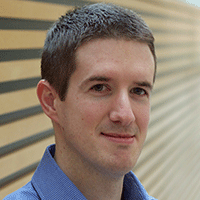Date: Saturday, June 21, 2025
Course Length: Length: Full Day (6hrs)
Course Start: 8:00 AM
Course pre-requisite: Slides and reading materials will be provided.
Course Description: This course focuses on the integration of mechanics and dynamical systems with machine learning (ML) via data-driven modeling and physics-based ML (PBML). The course begins with a review of calculus, linear algebra, regression analysis and various statistical methods. In the first part, prominent reduced-order models and model reductions techniques for physical systems will be systematically covered via coding examples. It is known that general-purpose black-box ML techniques do not perform well beyond the data they are being trained, and they lack physical interpretability and reliability for engineering applications. To address these issues, this course will introduce hybrid physics-based ML techniques using a variety of neural network architectures. New developments pertaining to physics-based ML techniques and software development will be taught using examples from diverse marine/offshore engineering applications.
What will students learn in this course:
- Be able to perform dimensionality reduction of CFD and experimental measurements using singular value decomposition & various projection-based reduced-order models
- Be able to intuitively understand and use deep neural networks for classification, control/optimization and flow-field predictions
- Learn integration of projection-based model reduction techniques with various deep learning architectures
Course Instructors

Rajeev K. Jaiman is currently a Professor and NSERC/Seaspan Industrial Research Chair in the Department of Mechanical Engineering at the University of British Columbia (UBC), Vancouver, Canada. Prior to his current appointment at UBC, he was an assistant professor in the Department of Mechanical Engineering at the National University of Singapore (NUS). Before joining NUS, he was the Director of CFD Development at Altair Engineering, Inc., Mountain View, California. Dr. Jaiman earned his first degree in Aerospace Engineering from the Indian Institute of Technology, Mumbai. He received his master’s and doctorate degrees from the University of Illinois at Urbana-Champaign (UIUC) with a Computational Science and Engineering option. His research interests broadly include multiphysics simulations, fluid-structure interaction, high-performance computing, data-driven modeling and physics-based machine learning. He is currently an Associate Editor of ASME-OMAE Journal, guest editor of Physics of Fluids, a senior member of AIAA and members of APS, ASME, USACM, SIAM and SNAME.

Jasmin Jelovica is currently an Associate Professor and NSERC/Seaspan Industrial Research Chair in the Departments of Mechanical and Civil Engineering at The University of British Columbia, Vancouver, Canada. He obtained his M.Sc. from University of Rijeka, Croatia, and D.Sc. from Aalto University, Finland, both in Naval Architecture and Marine Engineering. His research focuses on structural analysis, failure prediction and optimization using integrated data-driven models and FEA. He is currently a Deputy Editor for Ocean Engineering journal and member of SNAME, ISSC and ASME, and has P.Eng. license from Engineers and Geoscientists of British Columbia, Canada.